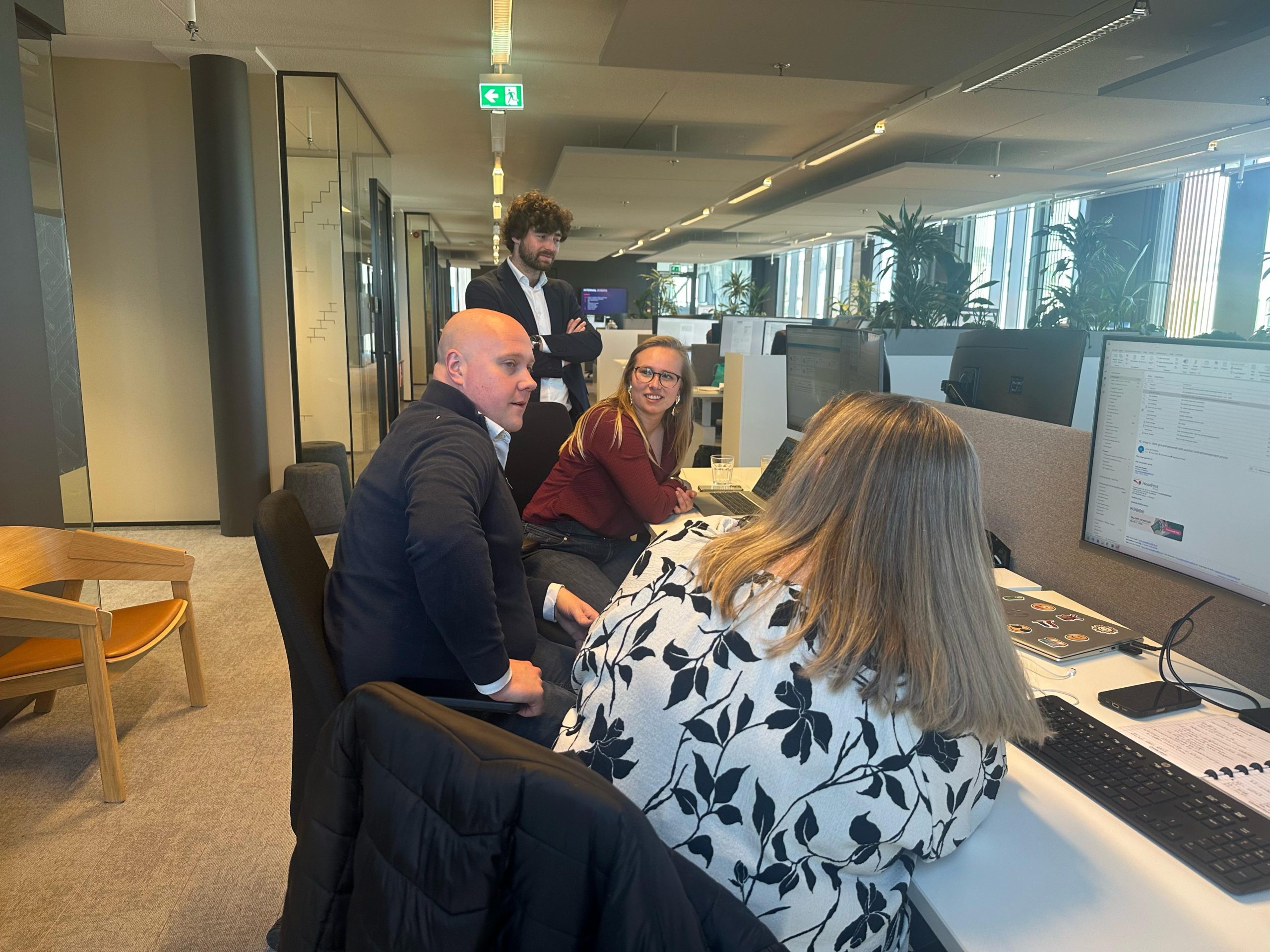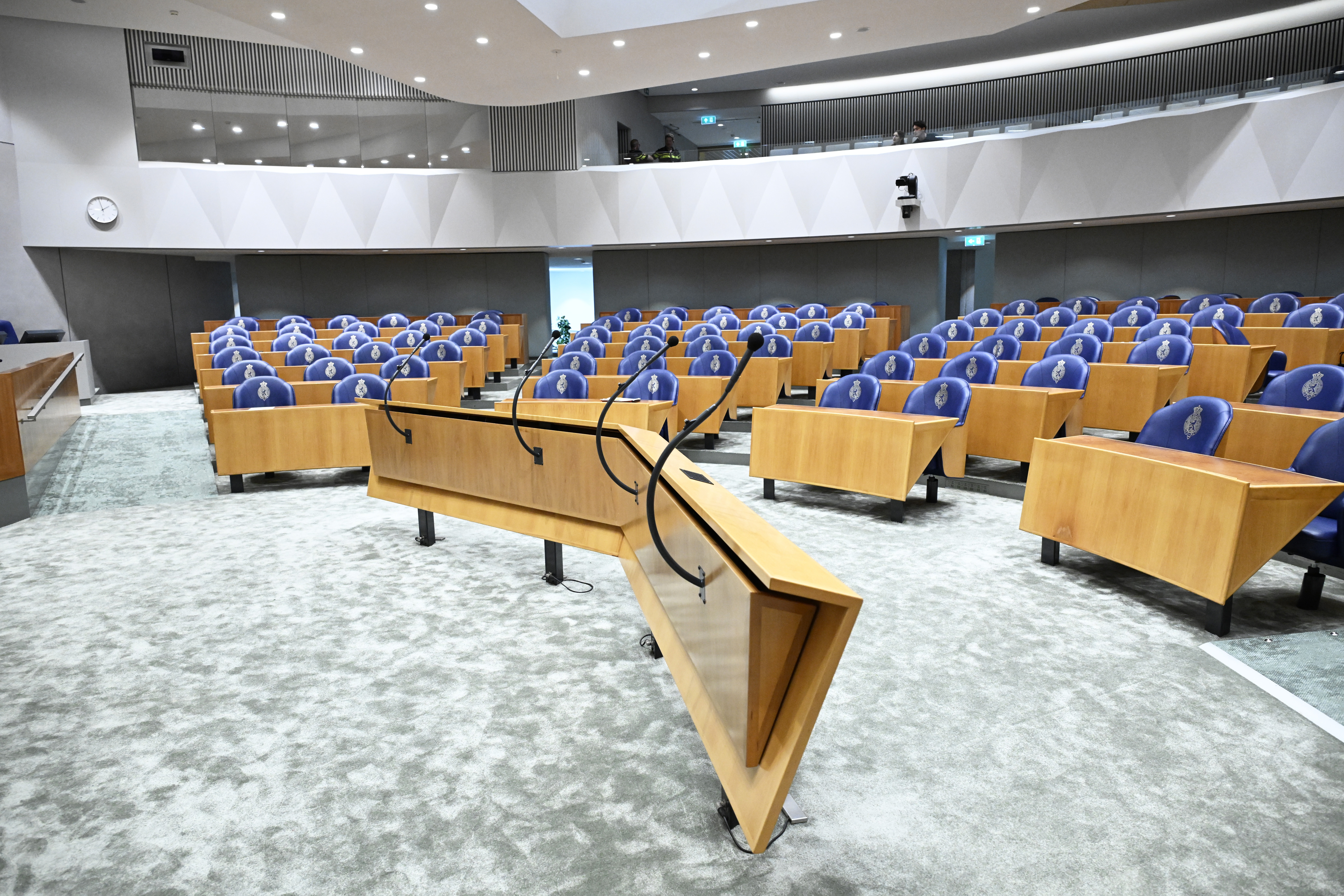Caretaker Minister of Social Affairs and Employment Van Hijum (NSC): “The government will not solve the labor market shortage.”
The above is just one of the sharp observations made by outgoing Minister of Social Affairs and Employment (SZW) Eddy van Hijum (NSC) during the fifth edition of ArbeidsmarktPoort. In front of a room of over 130 professionals from industry organisations, market parties and ministries, he addressed structural bottlenecks and political ambitions. The attention for the event reached the NOS Journaal, which reported (from 08:00 approx.) on the meeting in Nieuwspoort. Understandable, given the time and the content. Van Hijum wants to become the new top candidate of NSC.
Sharp dialogue
In a robust substantive discussion with moderator Hans Biesheuvel (and then the audience), Van Hijum discussed topics such as the More Security for Flexible Workers Act, the Clarification of the Assessment of Employment Relationships and Legal Presumption (VBAR), employers, the role of the polder and the limits of labor migration.
The balance between permanent and flexible work has not yet been achieved, Van Hijum stated. At the same time, he emphasized that “more migrant workers” are not a structural solution to the demographic decline and increasing aging. According to him, the key lies in increasing labor productivity, reducing administrative burdens and giving employers more room to do business. In order to improve labor migration qualitatively, the ministry is working on a covenant with multiple parties. In the context of labor migration and regulatory pressure, the Act on the Admission of the Provision of Workers (WTTA) was also discussed; in particular, the considerable regulatory pressure was highlighted. A well-known and very relevant concern, Van Hijum emphasized, but the goal – combating abuses among incoming, outgoing and onward loaners – essentially justifies the means.
Self-employed legislation
Legislation for the self-employed was also discussed extensively. The VBAR, which will soon be submitted to the Lower House, must provide more legal certainty in the grey area between employment and self-employment. Parallel to the VBAR, VVD, CDA, D66 and SGP recently presented a private member's bill: the Self-Employed Persons Act. The fact that this legislation comes from a coalition party seems unusual, but Van Hijum underlined the shared goal: fairer rules and better protection for workers. Van Hijum also did not leave the European pressure on the handling of the VBAR (and the introduction of the VBAR before 1 January 2026) undiscussed, as the bill must be part of the promised reforms that the Netherlands will implement according to the Recovery and Resilience Plan (HVP). Failure to comply could result in the European Commission fining the Netherlands and jeopardising the payment of 600 million of the total 5.2 billion euros.

Problems at UWV
Attention was also paid to the implementation problems at the UWV, among others, especially around disability and continued payment of wages in case of illness. Van Hijum acknowledged that structural reforms are necessary, but that there is a lack of time, capacity and political space to fully realize them now.
Several colleagues from HeadFirst Group were present, and together we looked back on a very successful event.

Request a free consultation

Questions about this? Please contact us.
Sem Overduin
Public Policy & Affairs Manager
Sem.Overduin@headfirst.nl
Oifik Youssefi
Public Affairs Officer
Oifik.Youssefi@headfirst.nl
Maaike van Driel
Head of Legal
Maaike.vanDriel@headfirst.group
Thomas ten Veldhuijs
Senior Legal Counsel
Thomas.tenVeldhuijs@headfirst.nl
Labor market advisor Saskia Grit (UWV): "Tightness in the labor market also offers many opportunities"
How to keep the Dutch labor market running when the shortage of personnel is emphatically felt at all levels is? Saskia Grit, labor market advisor at UWV, follows various trends and discusses with Oifik Youssefi of HeadFirst Group the effects of part-time work on the labor market, labor productivity and how inclusive technology and being a good employer can make a big difference make in a market that also faces the coming years has with tightness.
There are many stories going around about the labor market. How is it doing and to what extent is the image that it is "saturated" or "congested" correct?
If you look at the figures from the Central Bureau of Statistics (CBS), then you see that the labor market is historically tight. For fourteen quarters in a row, there have been more job openings than unemployed. The causes are well known but tough: aging population, part-time work, the 24-hour convenience economy (longer store opening hours, deliveries made late) .. We are European champions of part-time work, and that limits available labor hours. At the same time, the demand for labor is growing due to structural changes in the economy, such as the rise of distribution centers and delivery services. Looking ahead, we do expect some decline in tightness as unemployment rises slightly, but many staffshortages remain.
What trends or developments are you currently following with extra attention?
Two things strike me notice. First, international tensions, especially around import tariffs from the United States. According to scenarios from the Central Planning Bureau (CPB) reciprocal levies could lead to a decrease in economic growth of one percentpoint. The direct impact on unemployment remains limited, but it does paint a fragile macroeconomic picture. Second, there is of course the enforcement on false self-employment. UWV expects the next three years a decrease in the number of self-employedjobs by 4.7%. Some of those self-employed will move to salaried employment, but there will also people stop working. This mobility deserves our attention.
Where do entrepreneurs currently experience the most bottlenecks?
According to the business cyclesurvey of the CBS 34% of business owners experience staff shortages as the main obstacle in business operations. Insufficient demand follows at a distance with 19%, financial constraints stand at 10%, and shortages of means of production at 8%. At the same time, 36% do not experience any obstacles. The scarcity of labor remains thus dominant.
On the contrary, where do you see room for improvement?
Labor productivity. In 2023 and 2024 it declined at the macro level. In recent years the economy grew mainly because we started working more hours but that is finite. Some of the hours worked, for example, come from the group of pensioners who are working longer working longer. We need to move toward more value per hour worked. DThis can be achieved, for example, through technological support and process innovation.

How is the self-employed group developing?
The CBS recently indicated that the number of self-employed people in the first quarter of 2025 decreased by 28,000, especially among those offering their own labor. Enforcement on false self-employment plays a major role in this. From the business cyclesurvey of March 2025 shows that 42% of clients expect fewer self-employed workers hiring in 2025. At the same time a shortage of qualified personnel is the main reason for hiring self-employed workers anyway. Still more than 1 in 5 jobs is a self-employed job. Er are therefore still many self-employed people, but the dynamics are changing.
To what extent does the part-time culture contribute to this tightness?
The Netherlands champions part-time work as well as work. That partly cancels each other out. But it would be labor market-technically more favorable if people - who are willing and able - would work more hours. This is often not possible nowadays due to care responsibilities or lack of flexibility. Over half a million part-timers want to work more, but are not asked or cannot combine it with their lives. The additional care duties that many Dutch people have to deal with (informal care, caring for for children, etc.) should not be underestimated. Investing in childcare and better scheduling could help.
What policy measure would you suggest for a more resilient labor market?
The Netherlands needs to invest much more in inclusive technology. Dan can you denkand to innovations such as exoskeletons, AR glasses or AI tools that support people in physical or cognitive work. This increases the employability of groups that are now often left out of the picture, and of working people. There are already technological applications where mechanics receive instructions through glasses. Such innovations make it possible to make labor more widely accessible, which is crucial in a tight labormarket.
What about temp work anyway? What is your expectation for this in the coming years?
We have already seen a decline in the number of temp jobs since 2022. That will continue. Employers are hiring more quickly due to the tightness. In addition, the temporary employment industry is being more tightly regulated. The enforcement on false self-employment can actually opportunities provide opportunities for the staffing industry, because it can ensure that more people switch to temporary work..
Final question: to what extent is tightness actually a problem?
It really depends on your perspective. For employers it's tough, but for job seekers it offers opportunities. Scarcity makes employers more creative: they let go of job requirements, choose skills instead of diplomas. At UWV, we have 34 solutions to address staff shortages. If we continue to use them and invest in mobility and technology, shortages can also be an engine for innovation.
Want to know more about the job market? Saskia Grit shares her knowledge a few times a week on LinkedIn, via short summaries of new labor market insights.

Request a free consultation

Questions about this? Please contact us.
Sem Overduin
Public Policy & Affairs Manager
Sem.Overduin@headfirst.nl
Oifik Youssefi
Public Affairs Officer
Oifik.Youssefi@headfirst.nl
Maaike van Driel
Head of Legal
Maaike.vanDriel@headfirst.group
Thomas ten Veldhuijs
Senior Legal Counsel
Thomas.tenVeldhuijs@headfirst.nl
Public Affairs Podcast: Enforcing false self-employment and the WTTA in perspective
With the lifting of the enforcement moratorium on the DBA Act as of January 1, 2025, clients have become a lot more cautious about hiring self-employed workers. After all, if false self-employment is established, the Tax Office can impose additional taxes and correction obligations. But what if not the Tax Office, but the self-employed worker himself goes to court and questions the employment relationship? According to NRC, in half of the cases the self-employed person is vindicated, with far-reaching consequences for the client in question.
Sem Overduin en Oifik Youssefi van het public affairs-team bespreken verder in deze aflevering:
The Senate's consideration of the Workforce Authorization Act (WTTA). The political agenda for the coming period. A study on the impact of lifting the enforcement moratorium HeadFirst Group is working on. And how the lifted moratorium can cause a "waterbed effect," according to labor lawyer Joost van Ladesteijn, with the WTTA suddenly popping up.
Request a free consultation

Questions about this? Please contact us.
Sem Overduin
Public Policy & Affairs Manager
Sem.Overduin@headfirst.nl
Oifik Youssefi
Public Affairs Officer
Oifik.Youssefi@headfirst.nl
Maaike van Driel
Head of Legal
Maaike.vanDriel@headfirst.group
Thomas ten Veldhuijs
Senior Legal Counsel
Thomas.tenVeldhuijs@headfirst.nl
NBBU President Halbe Zijlstra: "Regulatory drift is counterproductive in the labor market"
The labor market polder has a new top man: Halbe Zijlstra has been the chairman of the Nederlandse Bond van Bemiddelings- en Uitzendondernemingen (NBBU) since March 2025. After his role as VVD parliamentary party chairman in Rutte II, a management position at VolkerWessels and having been active himself as a self-employed worker, he sees how the intermediary industry is at a crossroads due to, among other things, the possible introduction of the Law on the Admission of Temporary Workers (WTTA). A system change that Zijlstra believes could have major consequences: from huge sums of idle money, increasing administrative burden and exclusion of bona fide companies. In conversation with Sem Overduin of HeadFirst Group, he shines his light on the WTTA, the regulatory drive of The Hague and a contract-neutral social system for all workers.
Sem: You have done a lot in your career. From being a member of parliament at the local and national level, to being a member of government, director of a construction company and self-employed. What drew you to the presidency of the NBBU?
I became self-employed two years ago and did an assignment for several healthcare intermediaries. Gradually I came into contact with the NBBU and got to know this trade association as an organization that always bases discussions on facts and puts the practicability of policy and legislation at the center. When the chairmanship position became available, I saw the opportunity to contribute to an organization with a strong policy office and knowledgeable people. Working with a club like that is a pleasure.
Many people remember you from your time as a representative of the people: how does your political experience connect to this position?
As VVD group chairman in the Rutte II Cabinet, you are naturally involved in all dossiers. Among other things, I negotiated social agreements and the efforts to make "permanent less permanent and "flex less flex. In that cabinet we did a lot for the labor market. At the same time, I have experienced up close how recalcitrant the labor market file can be. I use that knowledge and insight not only to understand complex laws such as the WTTA in terms of content, but also to test their usefulness and feasibility. Too often in The Hague it appears that rules get bogged down in administrative obligations, without achieving the intended objectives. In fact, our labor market policy is one big regulatory distrust. The central question should be: what is the purpose of a rule? The connection with practice is often lost.
How did your first few weeks go?
Very intense, but very good. I fell right in with my nose in the butter, because of course there is a lot going on. I was directly involved in the parliamentary treatment of the WTTA in the Lower House. With many motions and amendments, we as NBBU had to be sharp and keep our finger on the pulse.
Recently, the House of Representatives passed the WTTA with space support. How does NBBU's position compare to this bill?
First, let me mention that the premise of the WTTA, a licensing system by which you try to separate the wheat from the chaff, is fine. But once again we have managed to turn it into a 'monstrosity'. Think, for example, of that 100,000 euro deposit that has to be deposited. You will literally have more than a billion 'idle money' in the bank soon. With that you completely flatten the entry of new innovative entrepreneurs.
I understand the idea of keeping out rogue parties and making entry difficult, but one thing just won't get through: rogue parties exist and will always exist. And these types of parties have one clear characteristic: they ignore the rules. And what is the answer to this? Even more rules. But how likely is it that these rogue parties will now comply with the rules? Zero. It saddles bona fide parties with even more rules and obligations. What we are organizing is the facilitation of even more abuses through the accumulation of rules. Regulatory drift is counterproductive here, because it creates more and more costs for the bona fide entrepreneurs, which only increases the competitive advantage of the rogue parties, because, after all, they do not follow the rules. There is one thing that is really important to combat abuses and that is enforcement! As NBBU, we therefore endorse the principles, but are critical of all the rules and obligations that have been added.
The WTTA is a complex and comprehensive bill, to say the least. Are your members adequately prepared for all the obligations and potential consequences?
Within the NBBU membership, awareness is high, but I feel that "out there" there is a lack of knowledge. I am very concerned about this, by the way. I really wonder if all the organizations that will soon have to deal with this are sufficiently aware of all the details and obligations. This is especially true for companies outside the staffing and placement industry. Too many companies do not know that the WTTA applies to them as well. We have to realize that almost every company that occasionally lends an employee is going to be covered by this law with all its obligations. There is talk of 15,000 to 20,000 companies, but I'm afraid that group is quite a bit larger.
An amendment to explicitly include a broadcast ban in the law was also passed by the House of Representatives by a large majority. With this, a sectoral ban on temping seems another step closer. What does the NBBU think of this development?
As I just indicated, we endorse the conclusions of the Roemer report and the principles of the WTTA. We said the same to the Lower House earlier. But amending the law to include temporary employment bans is really a bridge too far for us. It is also practically unfeasible in many sectors. We cooperate with the WTTA, but please do not impose even more rules and obligations on us. Don't go over it again. So we are resolutely against a ban on broadcasting. Because where do you draw the line? Where does a sector stop? We will also point that out to the Senate.

Where does this Hague regulatory frenzy come from anyway? And why is there always insufficient attention to enforcing the rules?
There is a political reality and a practical reality. In the political reality, everything works on paper, but the practicality is not always beneficial and desirable. It is also partly to do with a kind of political reflex: there is a fuss, abuses are reported, for example, and then there is always a call for additional measures and rules. After all, it is a way for MPs to show that they are actively working on an issue, often with very good intentions. But the solution to many problems is not always found in more rules. How does it work out in practice? And is the rule going to achieve the purpose for which it was intended? Those are very crucial questions. And as we pile up all these rules, it becomes increasingly difficult to enforce it all. It's much more effective to enforce existing rules than to add new rules on paper.
The WTTA aside. In fact, there is also a lot going on around the issue of false self-employment and the Tax Administration's enforcement since the beginning of this year. Are you noticing unrest among your members now that the enforcement moratorium has expired?
Sure. You saw, especially after all the media coverage, that hiring organizations did panic and stopped hiring self-employed workers. The panic has subsided a bit, but the uncertainty remains. Again, you see a disconnect between wishful thinking and what the intended outcomes are in practice. It remains a major risk for organizations if it turns out that a self-employed person is an employee after all, with all the consequences that entails. Incidentally, I do not want to deny that there are no abuses in the labor market, but I do believe that these distressing cases occur mainly at the bottom of the labor market. That is where we need to focus in particular. That is why we also support the legal presumption of employment below a certain hourly rate. This limit of about €38 is very good in my opinion. Incidentally, we think it is fair to introduce a legal presumption of entrepreneurship above that hourly rate, for example.

Finally, I also want to talk about a contract-neutral system. The NBBU has been advocating such a system for some time. Why is that important?
The majority of self-employed people have very consciously chosen self-employment. They value autonomy and flexibility. This automatically raises the question to what extent our labor market facilitates this group. The discussion about false self-employment has a strong fiscal and labor law character, and we have been working for decades to deal properly with the testing of the employment relationship. You really can't escape thinking about a contract-neutral system, in which all workers, regardless of their form of contract, simply contribute to the social security system. You then get rid of the whole discussion about the qualification question. You have guaranteed that all workers contribute to social security and vulnerable workers have a safety net.
How will you convince The Hague of such a system?
I remain modest about this, for I don't think I am capable of immediately turning the political-social debate on this. But I will certainly make an active contribution to the discussion. The difficult thing is that this discussion is being conducted from very deeply dug trenches. From the NBBU we will continue to point out the rapid changes in the labor market, the consequences of all the regulation and the opportunities of a contract-neutral system, because those opportunities are great. It meets the needs of many workers and offers people more freedom of choice. Furthermore, I want to forge many coalitions. We already enjoy working with parties such as the ABU, VvDN, Bovib and RIM, but I also want to forge alliances outside that field.
What would you like to give politicians and policy makers in The Hague?
If we want a well-functioning labor market, we must be willing to eliminate rules instead of introducing new ones. We must dare to take a fresh look at that labor market: what do workers want in 2025? And what fits with that in terms of regulations? And even more important: can we enforce those rules? Rules that cannot be enforced provoke abuse and that is the core of the current problem.
Request a free consultation

Questions about this? Please contact us.
Sem Overduin
Public Policy & Affairs Manager
Sem.Overduin@headfirst.nl
Oifik Youssefi
Public Affairs Officer
Oifik.Youssefi@headfirst.nl
Maaike van Driel
Head of Legal
Maaike.vanDriel@headfirst.group
Thomas ten Veldhuijs
Senior Legal Counsel
Thomas.tenVeldhuijs@headfirst.nl
Former student Nienke Veldhuis: "The Netherlands can learn from the clear sectoral approach in Belgium and Switzerland"
What began as a piece of feedback from her professor led to a master's thesis in which former master's student Alabor law Nienke Veldhuis examined platform labor and the qualification question in five legal systems: the Netherlands, Belgium, Germany, France, Spain and Switzerland. With her research, Nienke shows how theoretical questions about entrepreneurship and authority merge with concrete practical cases in multiple countries. Her recommendation: combine international comparison with sectoral precision to future-proof Dutch labor law. In conversation with Oifik Youssefi from HeadFirst Group, Nienke explains her motivations, findings and recommendations, and reflects on the recent case law surrounding Deliveroo and FNV/Uber.
What made qualifying an employment relationship an interesting topic for you to devote your master's thesis to?
I took a writing course during my Employment Law master's and could choose several topics. Platform labor and the qualification question immediately appealed to me, especially after the Deliveroo-ruling. Looking back, I read a note from my professor about the unclear weight of the entrepreneurship element as a contraindication in qualifying a labor relationship. From that moment I knew: this is what I want to get my teeth into, because this is currently playing at all sides of the labor market.
How do you listen to the answers to the preliminary questions in the FNV/Uber case?
The final verdict did not surprise me; in particular, the confirmation that my thesis did not contain crucial errors was a relief. It shows that academic analysis can match what the Supreme Council decides in this area. Salient detail: my thesis supervisor was Gerrard Boot, who, on behalf of the Court of Amsterdam the preliminary questions to the Supreme Court in the FNV v. Uber case, Stefan Sagel was my second reader and he acted as a lawyer on behalf of Uber in the same case.
To what extent was this issue alive among your fellow students and teachers?
There was certainly attention: other students were looking at requalification from the perspective of the social security or tax implications. The beauty of this topic is that everyone has different emphases in their approach. That diversity underscores that there is never one one-size-fits-all solution.
The gravity of this topic is not for everyone; some even call it a tough and boring subject for this reason. To what extent can you agree with that?
Boring it is by no means. The beauty of this theme and at all of themes in the legal field is its versatility: in our very first year of study, we learn that "it depends on the circumstances of the case" is at the heart of any legal issue. Indeed, from case to case, from sector to sector and from case law to case law, the same facts can be assessed completely differently. Both the European Unie as well as national legislators continue to provide new tools, but in the end it always remains tailor-made.

Given that versatility,how did you legally delineate your research?
My starting point was the preliminary questions in the FNV/Uber case itself. I tried to answer them systematically using the case law and legislation in the five selected countries.
Hhave you chosen the five countries and what stood out in their approaches?
Belgium and Germany naturally chose themselves because of geographical proximity and legal system similarity to the Netherlands. France and Spain because of their rich procedural history around platform work, and Switzerland because it was outside the European Unie but experiences European impact. It is striking how each country differente weights and has different perspectives: Belgium looks more emphatically at self-employment entrepreneurship, Germany to the embedding in the organization, France to the absence of subordination, Spain to a lesser extent to entrepreneurship versus authority, and Switzerland splits the criteria between the social security law and the labor law.
What can the Netherlands learn from these foreign approaches?
Belgium's sectoral system provides guidance and clarity: by sector specific guidelines and specific criteria. Switzerland shows how to strategically split social security law and labor law, allowing for different emphases per domain. These examples help legitimize customization in the Netherlands while maintaining consistent frameworks.
What is remarkable about the public debate surrounding the qualification test is the position of academics: hhow do you view the more active role of them in this debate?
I applaud it. Thanks to critical scientists, the the legislature (politicians) and judge (judges) sharp. The Deliveroo- and Uber cases are examples of how platform companies initiate developments that only become legally vital once the cases are more extensive. Academics are thus an important link between practice and law.
How does legal research in practice differ from what you learn in college?
During my internship at the Ministry of Social Affairs and Employment in the summer of 2024 I noticed how legislation is created in the Hague atmosphere. At a law firm, where I interned late last year, I saw that practical testability is central. In college, you learn ideal frameworks; in practice, they must be workable and take into account political and economic realities.
Now, after writing your thesis, how do you view the discussion of flex work and false self-employment differently?
My outlook is colored by understanding both self-employed people and employers. I now see more clearly what rights and obligations are involved and when someone unknowingly ends up in a false self-employment situation. That makes me more critical, but also more realistic about the need for clear and clear criteria.
Coming back to the "tough and boring" nature of this topic. How can this topic be brought more approachable to people who are affected by this but are not substantively concerned with it?
By concretely clarifying the rights of self-employed workers and employees. Many people do not know that they actually get more rights at peak times of false self-employment. Clear examples - such as a Deliveroo biker who can claim transition compensation - make the complexity tangible and relevant.

Request a free consultation

Questions about this? Please contact us.
Sem Overduin
Public Policy & Affairs Manager
Sem.Overduin@headfirst.nl
Oifik Youssefi
Public Affairs Officer
Oifik.Youssefi@headfirst.nl
Maaike van Driel
Head of Legal
Maaike.vanDriel@headfirst.group
Thomas ten Veldhuijs
Senior Legal Counsel
Thomas.tenVeldhuijs@headfirst.nl
House of Representatives approves WTTA: these are the implications for lenders
On April 15, 2025, the House of Representatives passed with a broad majority approved the Workforce Provision Admission Act (WTTA). This law introduces a mandatory admission system for all companies that provide labor, such as temporary employment agencies and secondment agencies. Contrary to what is sometimes thought, the WTTA is not exclusively aimed at temporary workers, but applies to all parties that are subject to the Wet allocatie arbeidskrachten door intermediairs (WAADI).n.
What does the WTTA entail?
The WTTA aims to improve the quality and reliability of labor intermediation services by introducing an authorization requirement for companies that provide labor. These companies must meet specific standards and may only engage in the provision of labor if they are admitted to the system. The aim is to combat rogue practices and strengthen the position of workers, especially migrant workers.
Timeline of the bill
- 2021-2022: The first contours of the WTTA are outlined, partly in response to reports on abuses in the staffing industry involving migrant workers.
- 2023: The bill will be prepared and put into consultation, where stakeholders can provide input.
- 2024: After processing the consultation responses, the bill will be submitted to the House of Representatives.
- April 8, 2025: The House of Representatives votes on several amendments and motions related to the bill. Major proposed amendments include:
- Exceptions to the admission requirement for specific sectors, such as social work companies and certain educational institutions.
- Minister's ability to deny or revoke admission in cases of convictions for employment discrimination.
- A duty of care for correct registration of workers in the Basic Registration of Persons (BRP).
- A maximum rate for the annual dues payable by lenders to the Permitting Authority set at €3,611.
- An accelerated review of the law after three years instead of five.
- Focus enforcement by the Labor Inspectorate primarily on sectors where abuses involving immigrant workers are demonstrably known.
- April 15, 2025: The House of Representatives approves the WTTA.
Impact on lenders
Within the WTTA, lenders may provide labor only if they have obtained authorization from the Minister of Social Affairs and Employment. To obtain this authorization, lenders must meet strict requirements, including the submission of a Declaration About conduct (VOG) and the provision of a financial borgsum of €100,000. Companies that use employment agencies, known as hirers, may only do business with employment agencies that are admitted to the market. A new admitting party, within the ministry of SZW, will make decisions about the admission of temporary employment agencies on behalf of the minister. This party can also suspend temporary employment agencies and revoke an admission in case of serious abuses.
Critique
Although the WTTA has broad political support, there has also been strong criticism, particularly about the law's increasing regulatory burden and broad scope. For example, warned the Advisory Committee on Regulatory Burdens (ATR) in early 2025 that the annual regulatory burden resulting from the WTTA could reach as much as 143 million euros. This amount comes from mandatory administrative burdens, such as obtaining inspection reports, holding financial securities, and application procedures for admission. In addition, there is concern about the scope of the law, which affects not only temporary employment agencies, but also other forms of employment mediation under the WAADI . This broad application, accordings critics disproportionately burdensome.

Outlook: treatment in the First Chamberr
The approval of the House of Representatives marks the next step in the legislative process. The bill now heads to the Senate for consideration. When this will take place is not yet known. A final implementation date is not yet known, but Minister Van Hijum (SZW) previously promised to send a letter to the Lower House in April with more information about the implementation date and timeline.
The introduction of the WTTA marks a comprehensive step in the regulation of organizations operating in the world of employment mediation in the Netherlands. It is now up to the Senate to further assess the bill and decide on its final introduction.
Should there be any questions about the WTTA, please contact us at publicaffairs@headfirst.nl
Report Regeldruk SZW-domain analysis and recommendations | Report | Adviescollege toetsing regeldruk
Request a free consultation

Questions about this? Please contact us.
Sem Overduin
Public Policy & Affairs Manager
Sem.Overduin@headfirst.nl
Oifik Youssefi
Public Affairs Officer
Oifik.Youssefi@headfirst.nl
Maaike van Driel
Head of Legal
Maaike.vanDriel@headfirst.group
Thomas ten Veldhuijs
Senior Legal Counsel
Thomas.tenVeldhuijs@headfirst.nl
Is there enough support for the Self-Employment Act? House divided on VBAR and Aartsen initiative bill
Zzp debate puts relations on edge: House divided over future VBAR and alternative proposal by VVD, D66, CDA and SGP
The political landscape surrounding the ZZP dossier is in full swing following the ZZP Committee debate on Thursday, April 3. Last week, the Parliamentary Committee on Social Affairs and Employment held a debate with Ministers Van Hijum (SZW) and Van Oostenbruggen (Taxation and Fiscal Service). The focus was on the progress of the much discussed and heavily criticized bill Verduidelijking Beoordeling Arbeidsrelaties en Rechtsvermoeden (VBAR). On March 27, Minister Van Hijum sent another parliamentary letter to the House of Representatives, in which he announced that he would amend the bill following the important ruling by the Supreme Court in the FNV/Uber case. This ruling led to external entrepreneurship being equated with employeehood and self-employment within the employment relationship.
MPs still critical of VBAR adjustment
During the debate, it became clear that several MPs still have strong reservations about the VBAR. The criticism mainly focuses on the fact that the proposed adjustments seem to be merely "codification of court decisions," which, according to several groups, is insufficient to effectively address false self-employment. For example, Rikkers-Oosterkamp (BBB) called the VBAR bill as "shooting with hail at a gnat," and MP Flach (SGP) once again called attention to breaking up the bill, since there is a lot of support and backing for the legal presumption of employment below a certain hourly rate.
Alternative proposal Aartsen (VVD): Belgian model as inspiration
VVD MP Aartsen used the debate to draw emphatic attention to his initiative bill, which is inspired by laws and regulations in Belgium. The proposal was published on Thursday morning, just a few hours before the zzp-debate. The essence of this proposal is that there will be more clarity in advance whether one is self-employed or an employee. There will also be more focus on the position of the self-employed person themselves, rather than criteria and elements within the employment relationship. This will provide clarity in advance and prevent false self-employment, according to Thierry Aartsen.
The parties D66, CDA and SGP support Thierry Aartsen's initiative. MP Vijlbrief (D66) emphasized during the debate that the proposal finally offers a clear legal approach to the problems that have existed for more than 15 years around self-employment and false self-employment.
NSC and PVV critical: agreements mainline agreement important
Yet Aartsen's proposal did not receive only positive reactions. The NSC and PVV, in particular, were decidedly critical, particularly because they feel that the proposal is not in line with the agreements previously made in the Framework Agreement. Indeed, the Outline Agreement states that work on the VBAR bill will continue.
MP Boon (PVV) was therefore critical of Aartsen: "I am shocked at how easily Aartsen steps over previously made agreements." MP Saris (NSC) also indicated that "a deal is a deal" and that NSC is sticking to the agreements in the Framework Agreement. This immediately made it clear that support from coalition partners NSC and PVV for Aartsen's proposal is not self-evident.

Recovery and Resilience Plan puts additional pressure on tackling false self-employment
It was also made clear during the debate that the Netherlands has agreements in place with the EU through the 2022 Recovery and Resilience Plan, which explicitly addresses tackling false self-employment. DENK MP Ergin asked explicitly whether the VBAR is mentioned by name in this plan, or whether alternatives such as Aartsen's proposal could possibly also meet the Brussels conditions. Minister Van Hijum indicated that he is looking into this, but at the same time stressed that changes to the agreements with the European Commission are limited. This ultimately involves €600 million.
Initial reactions from civil society
The Vereniging Zelfstandigen Nederland (VZN) responded critically to the debate. According to VZN, the problem with the VBAR remains that it mainly focuses on "repair" and codification, without actually offering a structural solution to the underlying problem of false self-employment. VZN stresses the importance of a clear and transparent assessment framework in which self-employed workers are given advance certainty. In that light, Aartsen's Belgian model appeals to them, but VZN also emphasizes that broader political consensus is necessary to truly reach a sustainable solution.
The coalition of industry associations, consisting of the ABU, NBBU, Bovib, VvDN and RIM, also remains critical of the VBAR. They have expressed that the VBAR is redundant after the Uber ruling and are calling for the legal presumption of employment to be implemented quickly and to actually get to work on social security reform.
Political relationships: PVV highly critical
The political dynamics surrounding this dossier are extremely fascinating. Currently, the proposal by VVD, D66, CDA and SGP can count on 41 seats in the Lower House. This is a solid base, but still insufficient for a parliamentary majority. The BBB is extremely critical of the VBAR and there is a good chance that this party will eventually support Aartsen's proposal as well. In turn, this will also have major implications for relations in the Senate, where the BBB has a solid position with 16 seats.
The coming period will reveal whether there will finally be a broad-based solution to the problem of false self-employment that has persisted for years. One thing is certain: political divisions remain and it will be a challenge to balance the two proposals.
Request a free consultation

Questions about this? Please contact us.
Sem Overduin
Public Policy & Affairs Manager
Sem.Overduin@headfirst.nl
Oifik Youssefi
Public Affairs Officer
Oifik.Youssefi@headfirst.nl
Maaike van Driel
Head of Legal
Maaike.vanDriel@headfirst.group
Thomas ten Veldhuijs
Senior Legal Counsel
Thomas.tenVeldhuijs@headfirst.nl
Research confirms: suspicion of employment greater with lower hourly rate self-employed worker
The labor market is constantly evolving. In particular, the position of the self-employed remains a topic of debate, both in society and in politics. The question of whether a person may be hired as a self-employed person is not always easy to answer. Recent research by SEO Economic Research offers new insights: by looking at the characteristics and hourly rates of self-employed workers with business clients, this research shows that many of the characteristics of employee status occur in self-employed workers with low hourly rates. They are more likely to meet criteria that qualify them as employees. These are interesting insights and results in the context of bill Verduidelijking Arbeidsrelaties en Rechtsverm presumption (VBAR).
More characteristics of being an employee at low hourly rate
The SEO study focuses on the characteristics and rates of self-employed workers and identifies the extent to which they exhibit characteristics of employment. The main findings are:
- Self-employed workers with lower hourly rates are more likely to experience work-related management and organizational embedding, characteristics appropriate to an employment relationship.
- Depending on the method by which the hourly rate is calculated, between 15 and 28 percent of self-employed workers could fall under a legal presumption of employment at a rate of 32.24 euros per hour.
- In sectors such as construction, creative industries and business services, the risk of false self-employment is greater because many self-employed workers depend on one or a few clients.
The VBAR and the legal presumption of employment
The question of how to deal with a clearer distinction between employees and the self-employed is a recurring discussion in politics and society. The VBAR bill attempts to clarify the employment relationship on the basis of an assessment framework and by introducing a legal presumption of employment. The latter means that at an hourly rate of 33 euros or lower, it will be assumed more quickly that an employment contract exists. Although the VBA part of much criticism organizations, industry associations and political parties, the R (legal presumption of employment) has broad political and social support.
The SEO study shows that a significant proportion of those employed at low hourly rates are in a dependent and vulnerable position. This makes a proposal such as the legal presumption of employee status below a certain hourly rate a logical extension of the problems identified.
Sectoral differences and the importance of legal presumption
The risk of false self-employment is not equally high in all sectors. The SEO study shows that there are sectors where workers have structurally low hourly rates and these workers also show more indications of being employees. These sectoral differences underscore the importance of careful legislation and regulation. The legal presumption is a tool that can combat abuses, while leaving room for true entrepreneurs to remain self-employed. This is important to strike a balance between protecting workers with low hourly rates, on the one hand, and otherwise leaving room and freedom to be entrepreneurial.
Hiring smartly in a world that is changing at lightning speed - this is how you get a grip!
How do you keep control of hiring when everything is changing faster and faster? Simple: with better data, strategic hiring becomes a lot easier. During Nevi and HeadFirst Group's 'Grip op Inhuur' event, experts shared their insights, figures and practical experiences. "Combining knowledge is now more important than ever," said Rutger Treffers, Commercial Director at HeadFirst Group.
Just before the event, the news arrived: Europe wants to spend as much as 800 billion more on defense. Purchasers know what that means. In an economy already at full throttle, it will only make the job market tighter.
During the 'Grip op Inhuur' event of Nevi Zuidwest & Noordwest and HeadFirst Group it became clear once again how strongly global developments affect the labor market. One of the 160 buyers present in the HeadFirst Group theater in Hoofddorp put it aptly: 'Earlier I did not see the link between our work and the daily news, but now I realize how much influence it has on our industry.'
Jolanda ten Hoeve, procurement and contract manager at ECT Rotterdam, also underlined the importance of that broad perspective: "As a professional, you have to understand what is going on worldwide and what effect that has on your organization. Agility has become even more important, especially with geopolitical tensions and labor market tightness."
By closely monitoring these changes and responding strategically to the tight labor market, buyers can not only meet challenges but also create new opportunities.
One hundred and sixty buyers gathered for an interactive afternoon organized by HeadFirst Group and Nevi Southwest and Northwest. How do you maintain control over hiring in a landscape where speed and flexibility are increasingly important? The presentations offered valuable insights and practical tools for buyers to keep an overview in a world that is changing rapidly.
What's going on in the hiring market?
First, the numbers, because all the presentations during the afternoon were solidly based on data. Geert-Jan Waasdorp, director and founder at Intelligence Group: "The labor market is still running at full speed. With a labor market participation rate of 85%, things are looking good." But, he warned, the market did reach its peak. "It's cooling off a bit."
Moreover, the job market is full of uncertainties. Think "black swans" - rare, unexpected events you can't predict. Trump? Russia?
But there is another problem, according to Waasdorp. Despite the mountain of data, much remains invisible, especially around flexible work. For example, he recently (only) discovered that all TNO and CBS surveys are only in Dutch.
And that while 25% of working people in the Netherlands do not speak Dutch. From ASML employees to Polish migrant workers - a sizeable group remains completely outside the statistics as a result.
Numbers that count
Of course it was also about the law DBA, false self-employment and the bill VBAR. According to Sem Overduin, manager Public Affairs of HeadFirst Group, there is no need to get into a cramp: "Make sure you have an up-to-date hiring policy and keep your documentation in order. Record clearly why you make certain choices. And involve the key people in your organization: make sure they have a good understanding of the process and legislation."
According to Waasdorp, the lifting of the enforcement moratorium on the DBA law particularly affects the public sector. "There have never been so few public contracts."
Another striking trend in the freelance and secondment market: "In no sector is the wage gap as small as here. Entrepreneurship here seems to go hand in hand with emancipation." said Waasdorp.
How well organized is your external hiring?
Advisor on external hiring Paul Oldenburg held up a mirror to the buyers present during the day: how well is your external hiring regulated?
Too often the focus is on the short term, processes are inefficient and clear rate agreements are lacking. Oldenburg clearly showed how to approach sourcing strategy in a smarter way. How do you improve the sourcing strategy? How do you make clear agreements with agencies? How do you work together more efficiently and avoid risks?
Smarter hiring is not just about cost savings. A well thought-out hiring policy also ensures continuity and compliancy.

Strong asset - global data
In the afternoon, attendees could choose from several in-depth sessions. One zoomed in on the staffing industry: how do you combine continuity and flexibility without high costs? And how do you work smartly with your supplier in doing so?
Edward Norg, Randstad's operations director, gave a clear answer:
"We often only look at the rate, but that's just the tip of the iceberg. The real profit is underneath: less turnover and absenteeism, lower induction costs, effective pool management - a flexible group of employees that moves with customer demand - and smart data analysis."
Data-driven hiring strategy
During the workshop on the ICT hiring segment, HeadFirst Group dived into the power of a dynamic tiering structure. Which data points are really decisive when managing suppliers? The answer lies in a strategic approach. "Hiring is not a matter of ad hoc decisions, but of data-driven optimization," says Sam van de Kreeke. "By formulating clear business objectives in advance and continuously testing them against relevant data - such as rates, conversion and turnaround times - you will attract the right suppliers and increase the effectiveness of your hiring policy," adds Boy Kies.
Changes in global economy and labor market
"With data, companies can spot fluctuations and trends early and respond accordingly," said Lex van der Giessen of recruitment agency Sonsbach and one of the invitees.
"Yet the current global economy and geopolitical situation do not make it any easier," he adds. "Despite increasingly deep insights, sudden disruptions can have a major impact - both economically and in the labor market."
The key? Agility. Van der Giessen "A flexible shell makes your organization more resilient. Companies that work exclusively with permanent employees have less clout. Flexible workers actually offer the opportunity to adjust quickly and attract the right people at the right time."
Jolanda ten Hoeve, procurement and contract manager at ECT Rotterdam: "It was a very fascinating event, especially because the presentations were largely based on interesting numerical underpinnings. That gave a nice factual picture of the developments in the labor market."
SOURCE: ZiPconomy
Request a free consultation

Questions about this? Please contact us.
Sem Overduin
Public Policy & Affairs Manager
Sem.Overduin@headfirst.nl
Oifik Youssefi
Public Affairs Officer
Oifik.Youssefi@headfirst.nl
Maaike van Driel
Head of Legal
Maaike.vanDriel@headfirst.group
Thomas ten Veldhuijs
Senior Legal Counsel
Thomas.tenVeldhuijs@headfirst.nl
Working visit by Member of Parliament Thierry Aartsen (VVD) to HeadFirst Group
Retrieved from Monday 17 March welcomed HeadFirst Group welcomed VVD Member of Parliament Thierry Aartsen for a working visit. As spokesman within the VVD, Thierry Aartsen is responsible for the labor market and the self-employed dossier. During the working visit was developments on the labour market, the Belgian laws and regulations concerning hiring self-employed people and the challenges we face as HR service providers.service provider experience.
Firmly bitten into the file labor market and self-employment
Thierry Aartsen has in recent been firmly entrenched in the labor market and the self-employed. As a member of parliament, he is working hard for independent entrepreneurs, combating regulatory pressure and the consequences of unclear laws and regulations. In previous debates on the lifting of the enforcement moratorium on January 1, 2025, he has among other things, advocated a "soft landing" and a realistic and workable approach, in which enforcement does not lead to curtailment and uncertainty for clients and self-employed entrepreneurs.
The role of an intermediary and valuable data
Marion van Happen, CEO of HeadFirst Group, gave Thierry Aartsen a brief organization about the company and the role and added value of an intermediary in the labor market. Marion took Thierry through the different types of services and the challenges facing the industry. Next, Ton Sluiter, Manager of Data at HeadFirst Group, gave an in-depth presentation on the data we collect and developments and trends in the labor market. In te presentation Ton highlighted how the demand for self-employment is developing and what skills and which skills and knowledge are in demand.
The ihiring process, practical challenges Belgium
After the presentations, we took to the shop floor together. Led by Sem Overduin of the public affairs team, Aartsen got a behind-the-scenes look at the recruitment and contract management departments. This gave him the opportunity to ask more questions about the hiring process and gain insight into the challenges our colleagues face. For example, it remains complex to assess labor relations holistically and ensure proper and clear assignment descriptions. Furthermore, we dwelled on the questions colleagues receive from clients and freelancers. This led to a constructive exchange of ideas and possible areas for improvement.
We also discussed at length laws and regulations in Belgium regarding the hiring of self-employed workers. The Belgian Labor Relations Act is an inspiration; in fact, a separate law regulates the assessment of the working relationship between contractor and client. The discussion underscored the need for a sound and future-proof policy that does justice to the interests and needs of both self-employed workers and principals.

Continued dialogue
Thierry Aartsen's working visit to HeadFirst Group was valuable and provided scope for depth in the developments in the labor market and the zzp dossier. We appreciate the useful discussions that took place and will continue to use our data and knowledge in the future to contribute to a good and substantive public-society debate.contribute to a good and substantive public-social debate on the future of the labor market.
Request a free consultation

Questions about this? Please contact us.
Sem Overduin
Public Policy & Affairs Manager
Sem.Overduin@headfirst.nl
Oifik Youssefi
Public Affairs Officer
Oifik.Youssefi@headfirst.nl
Maaike van Driel
Head of Legal
Maaike.vanDriel@headfirst.group
Thomas ten Veldhuijs
Senior Legal Counsel
Thomas.tenVeldhuijs@headfirst.nl








